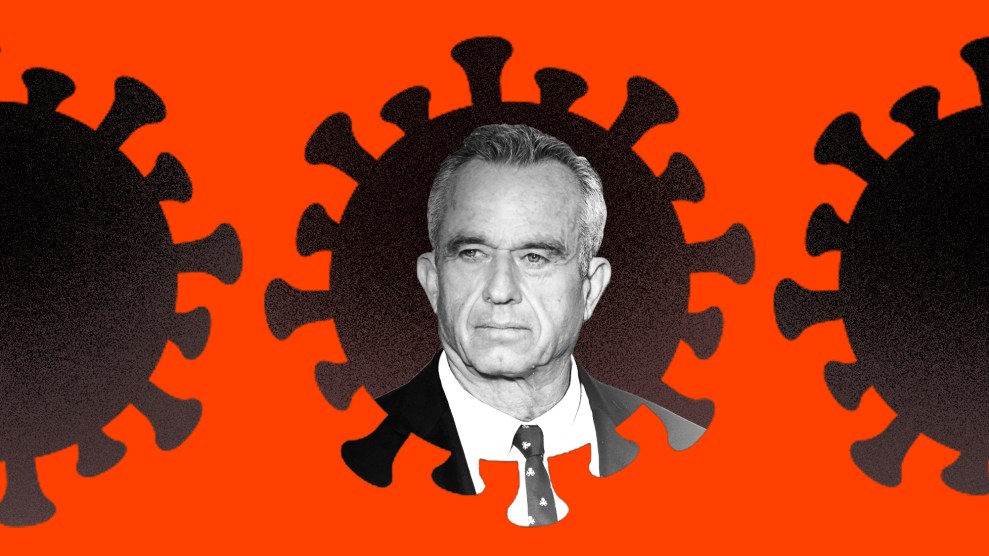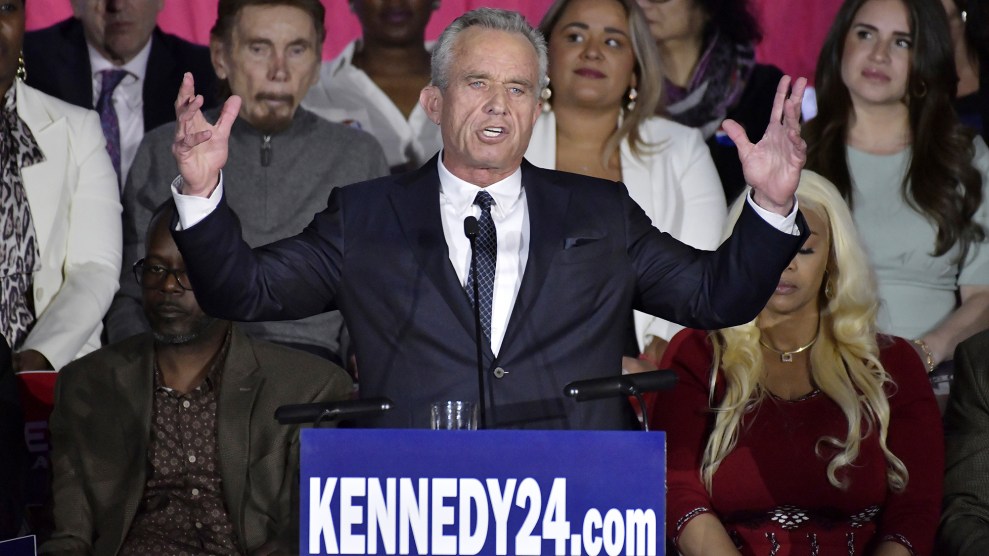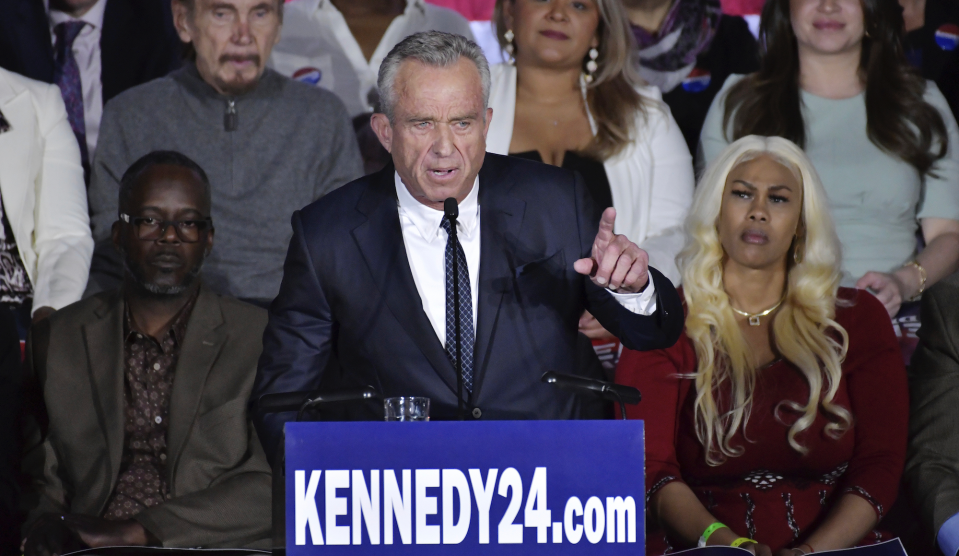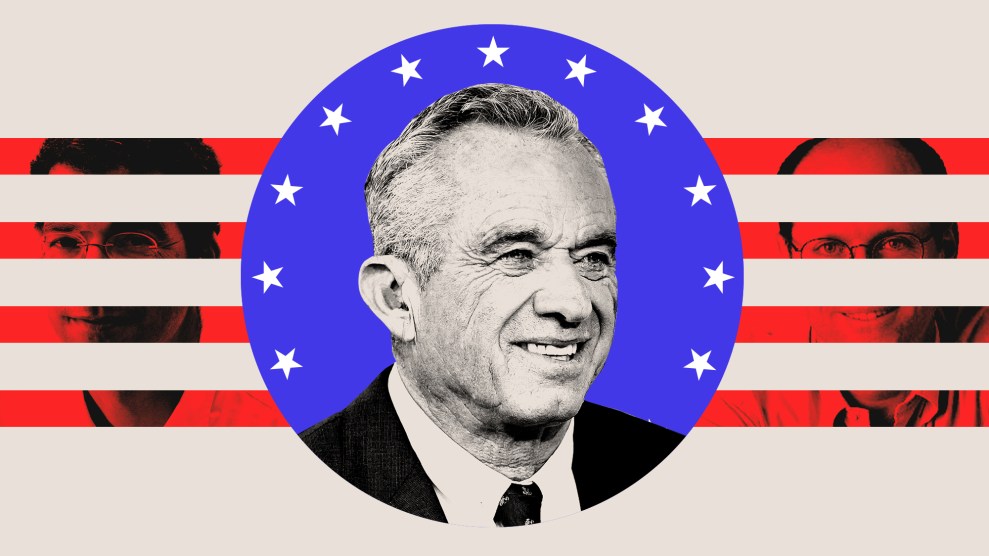
Mother Jones illustration; John Lamparski/Getty
Here is a bit of news involving Democratic presidential hopeful Robert F. Kennedy, Jr. that, unlike his antisemitic remarks and the unfortunate soundtrack during one of his appearances, didn’t exactly go viral. Earlier this week, the 9th Circuit Court of Appeals heard oral arguments in a case against a California law that was passed last year to prohibit physicians from spreading misinformation about Covid. Robert F. Kennedy, Jr. has been a key figure in the fight against this law.
It’s not hard to see why this wasn’t exactly headline material. The pandemic officially ended in May, but Covid news fatigue set in long before that. Yet this particular case is worth paying attention to because the people who oppose California’s Covid misinformation law have expanded their areas of interest. Their efforts could lay the groundwork to give contrarian physicians broad authority to go rogue on all kinds of medical issues, from the administration of routine childhood vaccinations to reproductive health, gender-affirming care, and beyond.
To understand why, you need some context. In early 2022, California state assembly member Evan Low introduced AB 2098, a bill that would allow the state medical board to discipline doctors who promoted false information about Covid—say, by claiming that unproven treatments could cure or prevent the disease, or that the vaccines were dangerous. The bill garnered broad support from the healthcare sector, including from the California Medical Association, the state lobbying group that represents physicians. California governor Gavin Newsom signed it into law last September.
That level of support is remarkable since physicians don’t typically love being told that there are certain things they can’t say. But the law is quite specific in what it does and does not deem to be misinformation, as California physician Nick Sawyer recently pointed out in a MedPage Today op-ed:
In his signing statement, Newsom specified that the bill is “Narrowly tailored to apply only to those egregious instances in which a licensee is acting with malicious intent or clearly deviating from the required standard of care while interacting directly with a patient under their care.” He further added, “This bill does not apply to any speech outside of discussions directly related to Covid-19 treatment within a direct physician-patient relationship,” and that discussing emerging ideas or treatments, including risks and benefits, “does not constitute misinformation or disinformation under this bill’s criteria.”
Despite these parameters, the ink on the governor’s signature had scarcely dried when the lawsuits started. There were four in total filed against Governor Newsom, the state attorney general, and the Medical Board of California by individual physicians and groups who claimed that the law violated their right to free speech. Their cause got some high-level expressions of support. The American Civil Liberties Union opposed the law. Physician and public health pundit Leana Wen expressed concern in a Washington Post op-ed last year that the new law could “have a chilling effect on medical practice,” discouraging doctors from tailoring protocols to the needs of individual patients. She also worried that it could set a dangerous precedent, paving the way for bills that would seek to limit what doctors can tell patients about other polarizing issues, such as abortion and gender-affirming care. Or, she wrote, “Imagine if anti-vaccine legislators introduced a bill that forbids pediatricians from offering parents information on routine childhood immunizations.”
That argument seems odd, considering that several of the groups that are suing California over this law are themselves notable critics of the routine childhood vaccinations that protect against devastating diseases like polio, tetanus, and whooping cough. One of the lawsuits was brought by the anti-vaccine doctors’ group Physicians for Informed Consent and the California chapter of Children’s Health Defense, which was founded by presidential candidate and vigorous vaccine antagonist RFK Jr., who also happens to be the lawyer representing the plaintiffs in the case. The complaint claimed the law “stops physicians from providing the latest accurate information to patients which may not be consistent with what, on any particular day, public health officials proclaim to be the ‘contemporary scientific consensus.’”
Another lawsuit was filed by a group of individuals, including physicians who have made a name for themselves in the “health freedom” movement that opposes vaccine mandates. One plaintiff in that lawsuit, Aaron Kheriaty, is the chief of medical ethics for a California-based group called The Unity Project, which supports not only health freedom but also the parents’ rights movement that rails against gender-inclusive curriculum and anti-racist school policies. Moms for Liberty co-founder Tiffany Justice is listed as a member of the Unity Project’s leadership team. Another plaintiff in that case, sports medicine doctor Tracy Beth Høeg, serves as a member of Florida Governor Ron DeSantis’ Public Health Integrity Committee, convened last year to “assess federal public health recommendations and guidance to ensure that Florida’s public health policies are tailored for Florida’s communities and priorities.” If that sounds vague, consider that at the same time, DeSantis called for a grand jury to investigate “wrongdoing” by the public health officials who endorsed Covid vaccines.
The right-wing movement against California’s Covid misinformation law has occasionally dabbled in far-right rhetoric. As physician and disinformation researcher Alison Neitzel has noted, during a public hearing about the bill in April 2022, one person who spoke threatened that “anybody who supports this bill will be held accountable under Nuremberg codes,” a reference to the war tribunals after World War II that punished Nazi leaders for their crimes. In January, Stew Peters, a live streamer and producer of the anti-vaccine conspiracy film Died Suddenly, tweeted the text of the newly enacted law to his 380,00 followers, commenting “California is a ROGUE state. It is time to put all these legislators on trial for murder.”
California is a ROGUE state.
It is time to put all these legislators on trial for murder.https://t.co/25Cc9YcRAN
— Stew Peters (@realstewpeters) January 2, 2023
In January, federal judge William B. Shubb, an 85-year-old George H.W. Bush appointee, ruled in favor of RFK Jr.’s clients, issuing a preliminary injunction against the law. Kennedy tweeted, “Huge win! This is not only a victory for California doctors but for professionals and citizens around the world in this battle for freedom.” But Fred Slaughter, the Biden-appointed federal judge who presided over the hearing for another one of the lawsuits denied the request for an injunction. One plaintiff in that case is Mark McDonald, a physician and member of America’s Frontline Doctors, the right-wing physicians’ group helmed by convicted January 6 insurrectionist and emergency room doctor Simone Gold. McDonald appealed that decision, which brings us to the 9th Circuit hearing earlier this week.
It’s unclear when a decision on that case will be issued. But if the judges uphold the earlier denial of the request for an injunction, the next stop is the Supreme Court. Meanwhile, as the other cases proceed, the attorneys working on them have indicated that they have no intention of easing up, despite the fact that the pandemic is over. Attorney Richard Jaffe, who worked with Robert F. Kennedy Jr. on one of the cases and supports his campaign, wrote in his legal blog in January, “Now that we have the preliminary injunction, I intend to shift the focus of the case, broaden it to deal with what I expect to be some workarounds by the boards to undercut the impact of Judge Shubb’s opinion and add a plaintiff and a couple of defendants. You’ll like it. I promise.” It’s not clear exactly how Jaffe intends to “broaden it,” but given his colleague’s statements against a wide range of vaccines, it’s possible that he’s thinking far beyond Covid. Which brings us back to Leana Wen’s worry that California’s law could be weaponized against childhood vaccines. Given the cast of characters involved in the pushback, it’s far more likely that this is exactly what they plan to do.

















